Star attraction: a guide to stargazing in the UAE
Wonder is written in the stars…
For the entirety of their existence, humans have stared into the space above their heads and attempted to draw meaning from the yawning chasm of the cosmos. Some of us see the fingerprints of deities and intelligent design, or alien worlds and ancestral planes; others – Big Dippers, constellations of the Zodiac and celestial excuses for a suspiciously wide range of personality flaws; or for a scientist – the light that reaches their eye might be the last exile of a star long-burned cold or another phantom clue to the mystery behind the origin of everything.
Whatever you see when you look up into the pixel-flecked firmament – the UAE is a wonderful place to practise this ancient pastime. Our skies are relatively unblotted by clouds for most of the year, and when we move away from the incandescence of the city, the stars multiply in number and brightness. Our task today is to find the best places to go stargazing in the UAE, what to pack for the trip, and what we can expect to see when we get there.
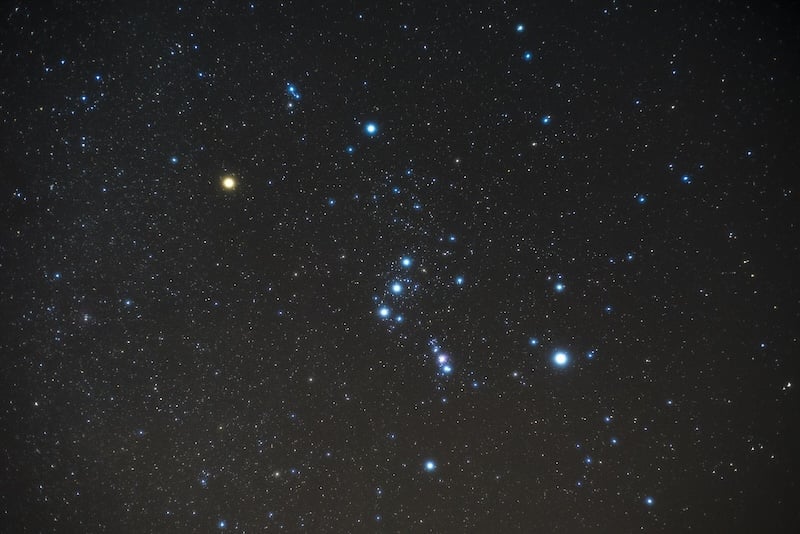
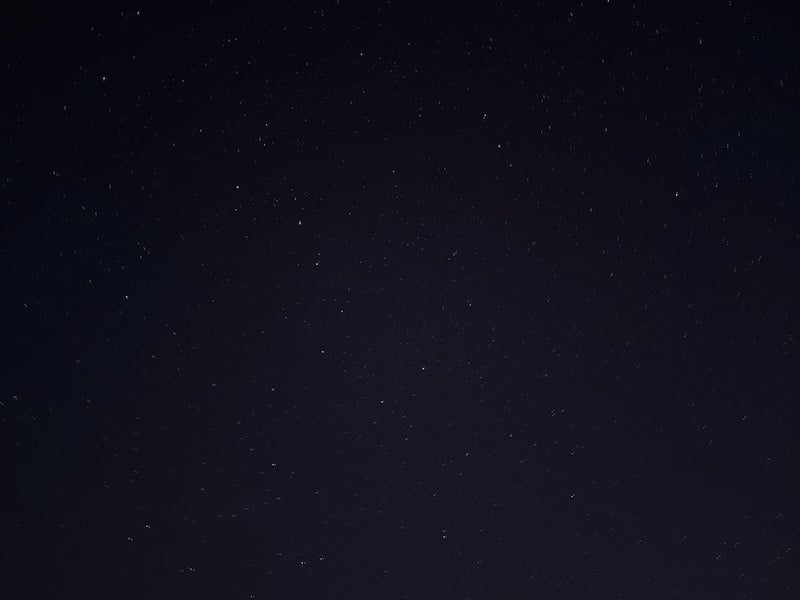
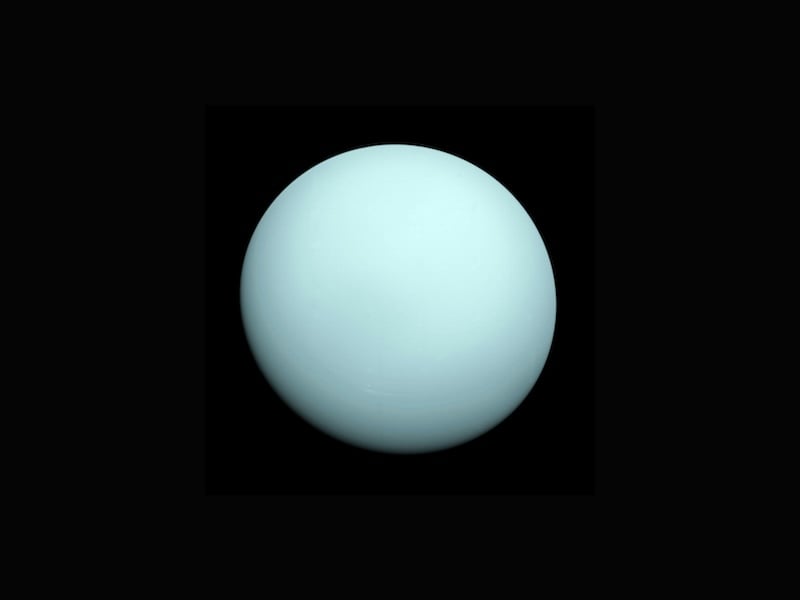
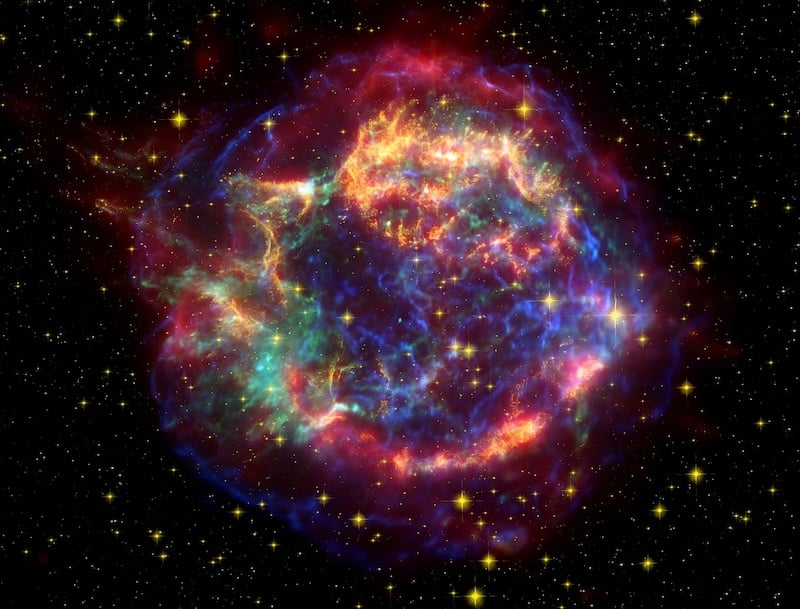
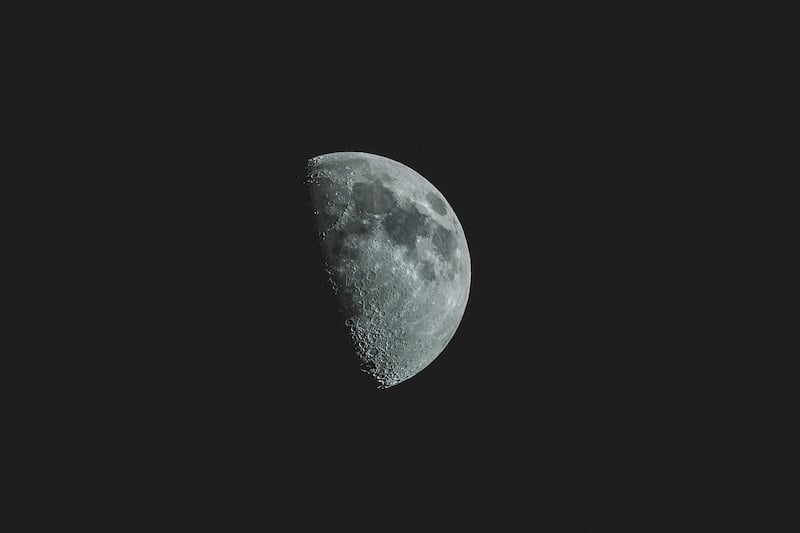






Orion
One of the celestial objects visible from Dubai without a telescope. Source: Khadijah Ahmad, Operations Manager of the Dubai Astronomy Group.
Big Dipper (Ursa Major)
One of the celestial objects visible from Dubai without a telescope. Source: Khadijah Ahmad, Operations Manager of the Dubai Astronomy Group.
Venus
One of the celestial objects visible from Dubai without a telescope. Source: Khadijah Ahmad, Operations Manager of the Dubai Astronomy Group.
Cassiopeia
One of the celestial objects visible from Dubai without a telescope. Source: Khadijah Ahmad, Operations Manager of the Dubai Astronomy Group.
Half Moon
One of the celestial objects visible from Dubai without a telescope. Source: Khadijah Ahmad, Operations Manager of the Dubai Astronomy Group.
Cosmic objects visible without a telescope…
Roadmap to the stars: The best locations for seeing stars in the UAE
Jebel Hafit Desert Park
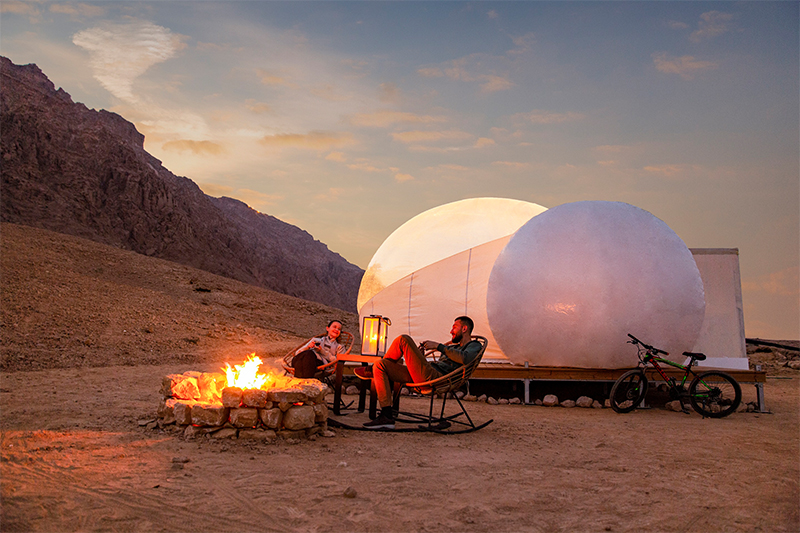
One way to give yourself a little leg up in the stargazing stakes is to get as much altitude as possible. Jebel Hafit is Abu Dhabi’s tallest peak, and although it’s only fractionally closer to the twinkling marbles overhead – its rocky pedestal takes you above the denser atmosphere, beyond the fog and the haze, giving you a more HD experience for the celestial show. It’s a bit of a drive from the UAE’s big cities (around two and a half hours from Dubai, and two hours from Abu Dhabi), but the great thing about this destination is that there’s a Pura Eco glamping resort offering a range of tented and lodge accommodation (priced from Dhs450). There are also pitches for DIY camping priced from Dhs150.
Al Quaa Milky Way Spot
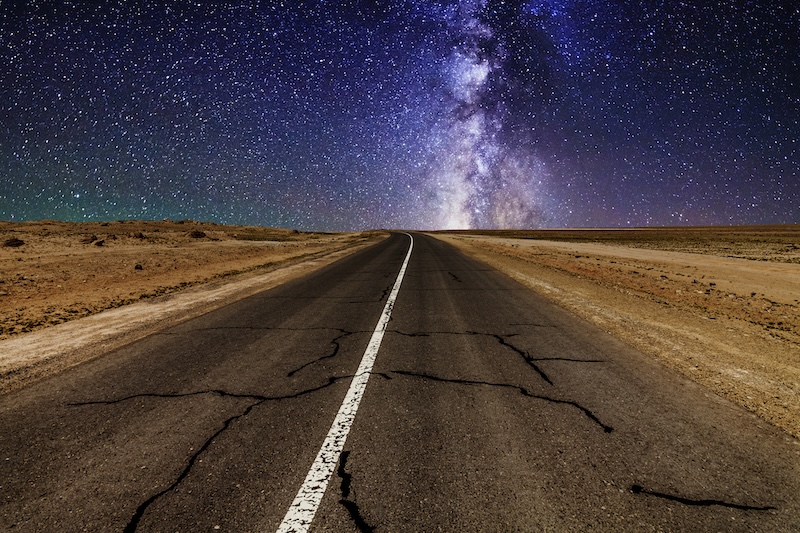
The sort of place you’d expect to visit when an astrophysicist says “I know a spot”. This stellar Abu Dhabi nook is about as-remote-a-sky-staring snug as you’ll find in the UAE, and its precise GPS digits used to be a closely gatekept secret. But amateur astronomers are a progressive bunch – maybe all that cosmic pondering gives them an innate reverence for transcending the self, perhaps it’s a contagious case of the space crazies – whatever the reason, the location is now easily Google-able online and there’s even a casual camping hub that’s sprung up near by. It’s about two and a half hours from Dubai, and 90 minutes from Abu Dhabi city, requires an SUV for ingress, and as the name suggests, can provide some galactically good long exposure photo ops of our native star cluster’s stunning spiral arm.
Al Qudra
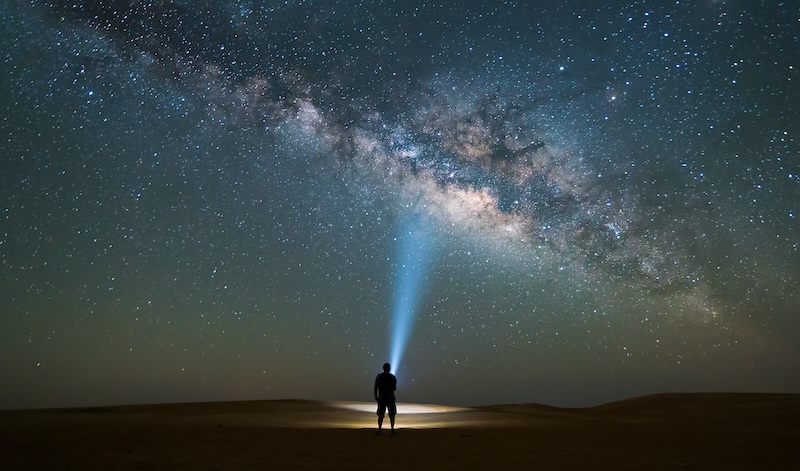
What is undoubtedly one of the best-known stargazing locations in the UAE, Al Qudra is easily reachable from Dubai. Which, because of light pollution, is also its main detraction. The best advice is to head a little further out, beyond the lakes and along the cycle track – to a more remote spot, shy of headlights and hubbub. Because of luminosity levels – a telescope may be your best option here, you can find inexpensive ones online that will allow you at least a ‘lite’ version of the James Webb experience.
Wadi Shawka
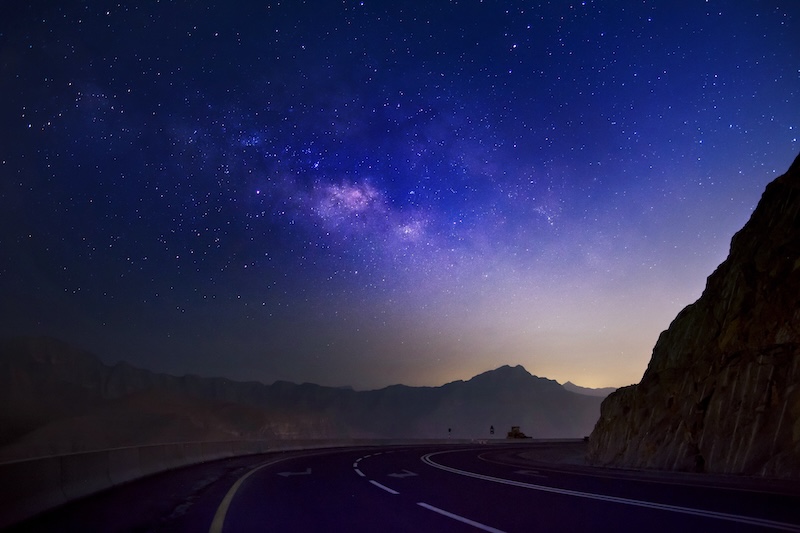
Another great locale for watching the heavens cook, this Ras Al Khaimah gem’s natural wadiscape brings all the hikers to its yard. It’s conveniently located for Dubai’s star-struck up-lookers, at less than an hour’s drive from the metropolis’ Downtown. Star pupils make sure they arrive in daylight hours to scope out a suitable camping spot, and make the most of the clean mountain air. If you’re feeling adventurous there are lakes in them there Shawka Trail hills, and a kids’ play area (with barbecue pits) near the dam.
Star Talk
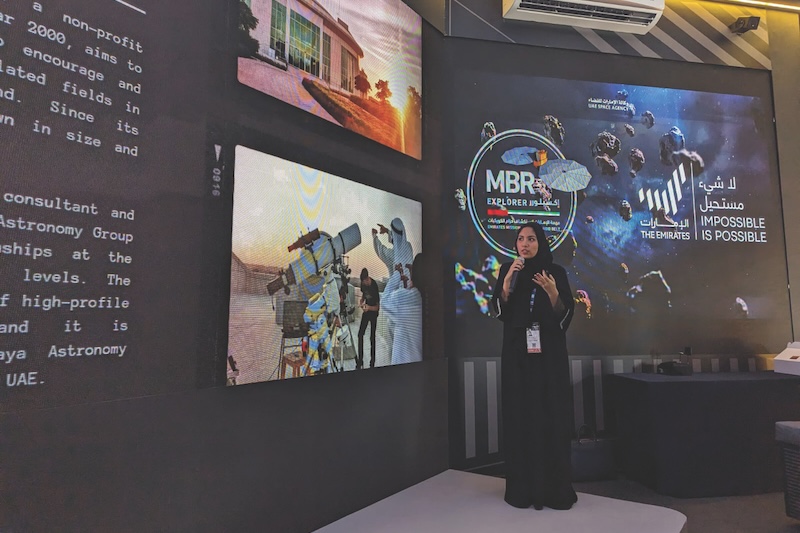
To help you get the most out of your UAE stargazing trip, we spoke to an esteemed regional ambassador for the night sky – Khadijah Ahmad, Operations Manager of the Dubai Astronomy Group.
If you don’t have a telescope, which constellations are the best ones to look out for?
Orion, Ursa Major (containing the Big Dipper), Cygnus, and Cassiopeia.
Which times of year can we catch the annual meteor showers?
The Perseids peak around August 12 and Geminids on December 14, these are the most prominent meteor showers. They can be observed without telescopes, preferably after midnight, from dark locations away from city lights.
What time of year is best for stargazing in general?
Stargazing is favourable throughout the year in the UAE. However, cooler months, particularly from October to March, provide clearer skies and more comfortable weather for extended observation sessions.
What’s the most beautiful thing in the sky for you?
For me, the most beautiful celestial object is the Milky Way galaxy stretching across the night sky, especially when observed from a remote location far from light pollution such as Al Quaa Desert in Abu Dhabi.
What’s your favourite space fact?
As of now, thousands of exoplanets (planets orbiting stars outside our solar system) have been discovered. Some of these exoplanets are located within the habitable zone of their parent stars, where conditions might be suitable for the existence of liquid water and, potentially, life as we know it.
A stargazer’s toolkit
If you’re interested in earning your star-hunting badge, we recommend adhering to the Boy Scout motto: Be Prepared. To help you with that, we’ve put together a checklist of all the essentials, plus a couple of ‘notessentials- but-I-deserve-a-treat’ items.
Telescope
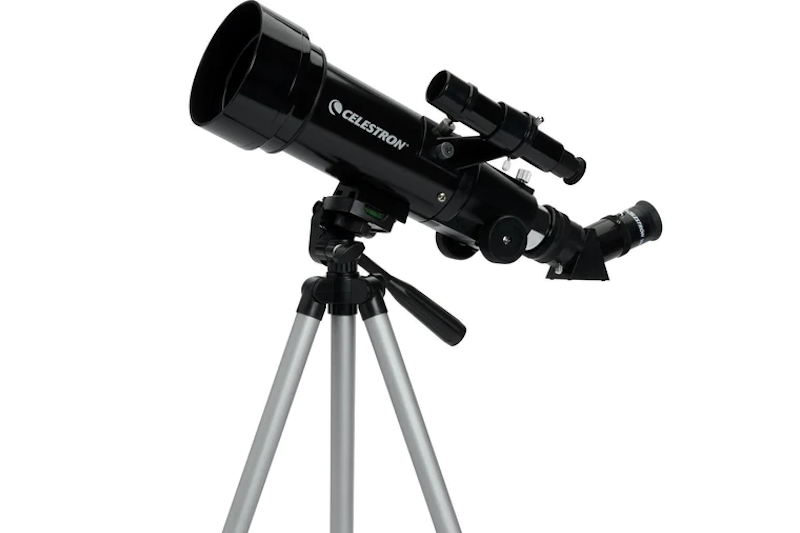
Salesman: “If you’re looking for a powerful, entry-level, telescope” *slaps roof of Celestron Travelscope 70* “you can’t go wrong with a Celestron”. This little beauty is a 70mm refractor telescope with enough muscle under the hood to let you peer at planets, moons, star clusters and even the odd nebula. It even comes with its own backpack for maximum portability and with its fully coated glass optics it really is a sight for starry eyes. Dhs538.
Star Map
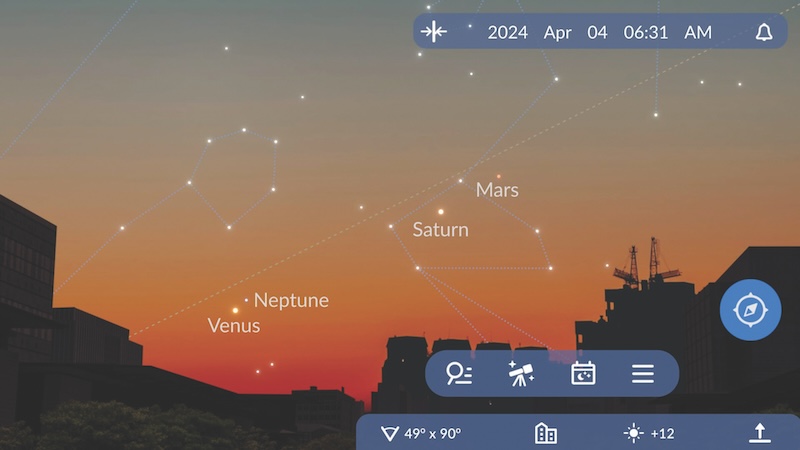
There are approximately 200 billion trillion stars in the observable universe and almost as many star chart apps. Our pick of the digital constellation is Star Walk 2. It provides the best balance of price, offline functionality (patchy 5G is an occupational hazard for this pursuit), ease of use for newbies, and attractive visuals. It’s got Big Dipper energy through and through. Dhs12.99, available via Apple and Google Play stores.
Blanket
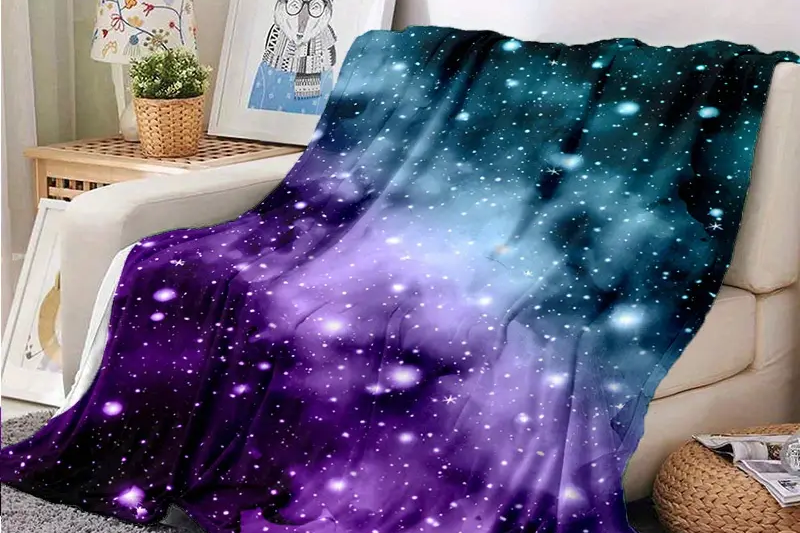
As above, so below. The ultimate accessory for late night alfresco cosmic voyeur sessions, this snazzy space-themed Galaxy Blanket will keep you toasty warm and looking audaciously cool. In a book club kind of way. Dhs41.
Head torch
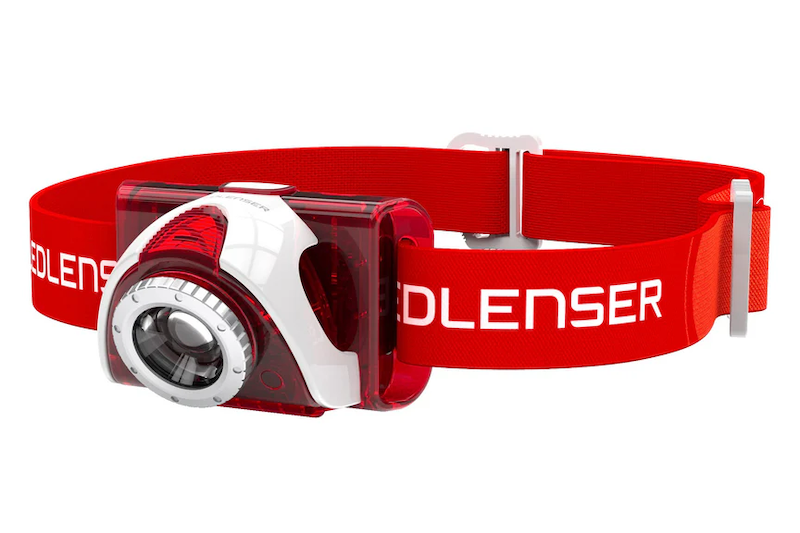
Few things say “I’m living off-grid” as loudly (or as brightly) as a head torch. These camping gadgets mean you can keep both hands free for manipulating the telescope, and/or snacking. The LEDLENSER Seo5 comes in a fashion-forward bright red decal – meaning Mars doesn’t have to be the only one dressed in a sultry crimson number for the night. Dhs300.
Snacks
If there are no snacks, is it really a camping trip? Our favourite midnight feast beneath the stars, is the South African biltong-style chilli bites you can grab from Waitrose and Spinney’s. Beefy chews beneath endless blues for the win. Around Dhs13.

Electronic bug repelent
No lights, no DEET, no mess – the new generation of bug repellents, exemplified by Thermacell are the best way to ensure a bite free night in peak bug season. They’re not currently available in the UAE, but you can get them shipped internationally through Amazon. Do yourself a favour though and stock up on the liquid refills whilst you’re in that order cart. Around Dhs130.
Images: Getty/Archive
